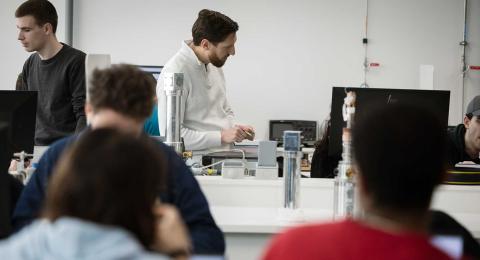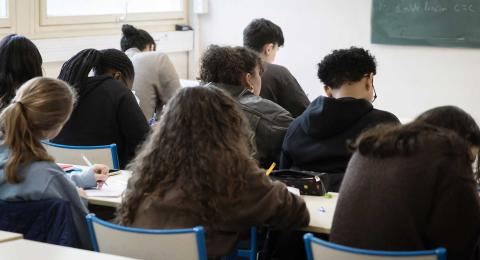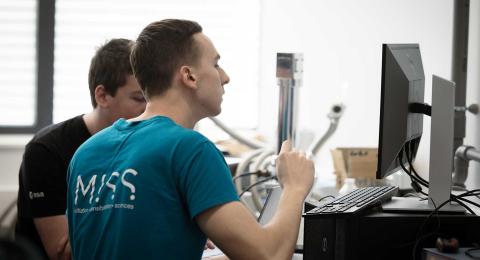This master's program trains experts in human movement analysis, combining physical ergonomics, biomechanics, data science, robotics, and cognitive sciences. Students deepen their knowledge in musculoskeletal modeling, AI applied to movement, and human-machine interaction, blending scientific methodology with technological projects. The program includes numerous practical sessions (measurement, programming, etc.), internships, specialized conferences, and courses in project management.
The master’s program covers data science (statistics, machine learning, data visualization), movement analysis (3D biomechanics, sensors, musculoskeletal modeling), physical engineering (mathematics, mechanics, robotics), scientific methodology, and cognitive sciences (AI, psychophysics), with programming as a transversal skill.
In the first year, students gain solid foundations through practical projects. In the second year, the program specializes in physical ergonomics, assistive robotics, human-machine interaction, AI for movement, and systems approach. The second semester is dedicated to an extended internship in a lab or company (health, sports, R&D, etc.). The program also includes modules in project management, innovation, and entrepreneurship, complemented by immersive experiences: practical work (measurements, programming), hackathons, interdisciplinary conferences, and collaborative projects.
Information
Skills
Acquire and apply complex and highly specialized multidisciplinary knowledge.
Engineering and data science applied to human movement.
Objectives
The Master’s program in STAPS – Engineering and Ergonomics of Physical Activity (IEAP) at Université Paris-Saclay trains professionals at the intersection of human movement science, engineering, and data science. It is built around a single track, Engineering, Data Science, Human Movement (Ingénierie, Data Science, Mouvement Humain, IDSMH), open to students from STAPS (sport sciences), fundamental sciences, and engineering backgrounds, as well as engineering students in a dual-degree program.
The curriculum develops a dual expertise in engineering and data science applied to human movement, addressing the growing needs in assistive robotics, human-machine interaction, and movement analysis across professional, sports, and healthcare contexts. The goal is to design human-centered technological systems capable of measuring, modeling, and analyzing both healthy and pathological movement.
The curriculum covers a broad spectrum, including data science (statistics, machine learning, data visualization), human movement analysis (3D biomechanics, sensors, musculoskeletal modeling), physical engineering (mathematics, mechanics, robotics), scientific methodology, and cognitive sciences (AI, psychophysics). Programming, a transversal skill, is applied across all these fields.
In the first year (M1), students acquire strong foundational knowledge, applied through hands-on projects (technical reports, technological projects, internship). In the second year (M2), the program offers specialization in physical ergonomics, assistive robotics, human-machine interaction, AI for movement, and system-based approaches. The second semester is fully dedicated to a long-term internship, either in a research lab or in industry (health, sports, R&D, etc.).
The training also includes modules on project management, innovation, and entrepreneurship, reinforced through immersive experiences such as practical labs (measurement, programming), hackathons, interdisciplinary conferences, and collaborative projects.
Career opportunities include human movement analysis, physical ergonomics (occupational health, workplace design), sports performance, R&D in human-machine interaction, robotics, and data science applied to human behavior. Graduates go on to work as R&D engineers, data scientists, research officers, ergonomists, technical sales engineers, or pursue PhDs (CIFRE fellowships or ministerial contracts).
The program relies on a strong academic network within Université Paris-Saclay: the Faculty of Sport Sciences, the Faculty of Science (Departments of Physics and Biology), CentraleSupélec, UVSQ (Faculty of Sciences), and Polytech Paris-Saclay.
Career Opportunities
Career prospects
Après un Master ou Master + Doctorat : ingénieur (R&D, contrôle, production…)
Après Master + Doctorat : chercheur ou enseignant-chercheur
Expert science des données
Après un Master : Data scientist
Après un master : Chargé(e) d’études
Responsable de projets R&D
Consultant
Chargé.e de recherche et innovation
métiers de la recherche
enseignant.e-chercheur.se (après un doctorat)
Ergonome des Interactions Homme-Machine – IHM
Ergonome spécialiste Facteurs Humains
Chargé de mission / projets
Ingénieur Facteurs Humains
Responsable suivi et évaluation de projet
data scientist
Further Study Opportunities
Chercheur/chercheuse en R&D ou expert·e en modélisation et analyse de données dans des entreprises ou laboratoires de pointe.
Data Scientist, Data Analyst, Ingénieur·e en Machine Learning dans des secteurs innovants (tech, finance, santé, énergie, etc.) ;
Doctorat
Ingénierie études, recherche et développement
Les étudiants de cette mention peuvent se tourner vers la recherche à l’issue du M2
Les étudiants titulaires d’un M2 ont la possibilité de poursuivre dans la recherche en doctorat
Thèse de doctorat
Fees and scholarships
The amounts may vary depending on the programme and your personal circumstances.
Admission Route
Capacity
Available Places
Target Audience and Entry Requirements
This Master's program is open to students from STAPS Bachelor's degrees, the dual-degree STAPS-SPI Bachelor's from Université Paris-Saclay, as well as from Bachelor's programs in Science and Engineering. It is also offered as a dual-degree option for engineering students.
As part of the selection process for entry into the first year of the Master's program (in accordance with the law of 23/12/2016) and subject to capacity limits, applicants must have completed a Bachelor's degree in one of the following fields: STAPS APA&S, STAPS Sport Training, STAPS Engineering and Ergonomics of Physical Activity, Life Sciences, Science and Technology, Mathematics, Biology & Health, or Physical Engineering. The program also welcomes students or professionals from paramedical fields (Physiotherapy, Occupational Therapy, Ergonomics, Osteopathy, Podiatry, Medicine, Nursing, etc.). Other backgrounds may be considered upon review of the application, especially for international degrees. For students in initial training, particular attention will be paid to final grades in scientific subjects. Academic results should be consistent with at least "Honours" (equivalent to *Assez bien* to *Très bien*) in the third year of the Bachelor's degree.
Application Period(s)
From 30/01/2026 to 15/05/2026
Supporting documents
Compulsory supporting documents
2nd letter of recommendation (compulsory for candidates who have already been enrolled in higher education in France before).
Motivation letter.
All transcripts of the years / semesters validated since the high school diploma at the date of application.
Certificate of French (compulsory for non-French speakers).
Curriculum Vitae.
Detailed description and hourly volume of courses taken since the beginning of the university program.
Additional supporting documents
VAP file (obligatory for all persons requesting a valuation of the assets to enter the diploma).
Supporting documents :
- Residence permit stating the country of residence of the first country
- Or receipt of request stating the country of first asylum
- Or document from the UNHCR granting refugee status
- Or receipt of refugee status request delivered in France
- Or residence permit stating the refugee status delivered in France
- Or document stating subsidiary protection in France or abroad
- Or document stating temporary protection in France or abroad.










